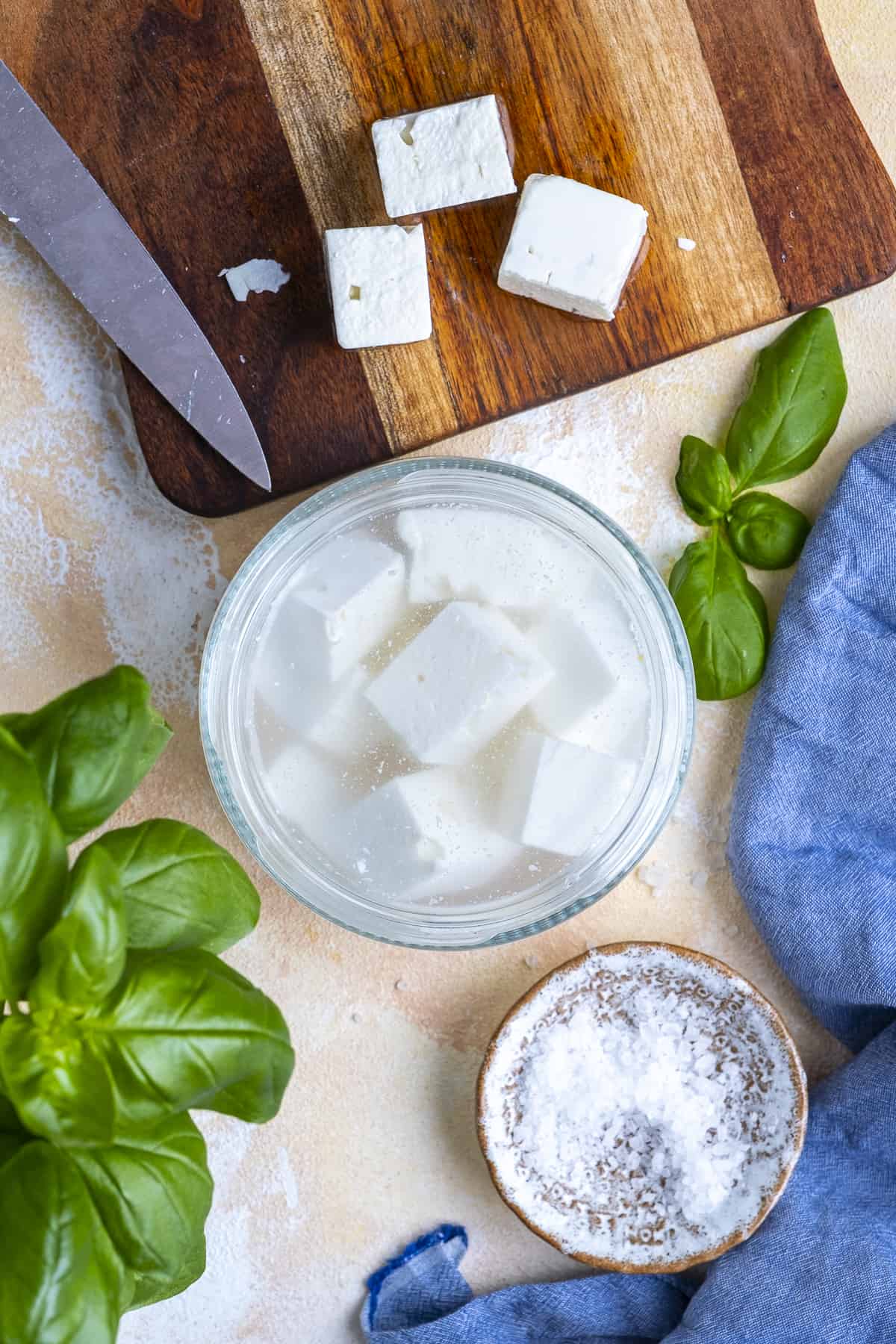Feta cheese is a staple in our kitchen and we always have some in the fridge. If you love it as much as we do and want to learn how to store feta cheese properly to keep it fresh, this post is for you!

We often use feta cheese to make yogurt dip haydari, which is one of our favorite meze dishes. And there is always some leftover feta cheese crumbles afterwards. So what do we do with it? Well, we either eat it at breakfast the next morning or store it in the fridge for later use.
We do love this soft cheese in the simplest way: Combined with tomatoes, cucumbers, olives, onion and with spices like oregano and sometimes red pepper flakes. It is also a great snack with a little bread to suppress hunger. And it won't last very long in our home.
No idea what feta cheese is? It is a Greek aged cheese that is traditionally made from sheep's milk only or a combination of sheep and goat's milk. It is healthy and packed with nutrients. Outside Greece, there are white cheeses made with cow's milk. Their tangy taste and crumbly texture is very similar to feta's as they are made with the same aging process.
How Long Does Feta Cheese Last?
Greek feta cheese is matured in brine, a solution of water and salt, and preserved in large barrels. At supermarkets, it is often sold in sealed packages. And an unopened package of feta lasts for several months in the refrigerator, but always check the expiration date before consuming it.
Feta comes with very little brine in its package. Similar to other fermented foods like pickles, feta is likely to dry out and lose flavor when the package is opened and it is removed from brine and exposed to air. So you might wonder how to keep feta fresh and extend its shelf life.

The best way to keep it fresh in the fridge for 3-4 days is wrapping it with a dampened paper towel and then keep it in a container. It is definitely not a good idea to simply keep it in plastic wrap or in a plastic bag.
And if you are not planning to use it in a few days and want to keep it longer, you need a simple solution: Make your own brine! This keeps the feta fresh for a few weeks.
Ingredients For Feta Cheese Brine
Just like when preserving green olives, we only need 2 ingredients to make the brine: Water and kosher salt.

Water should be at room temperature. If you find it difficult to dissolve salt in it, heat half of the water, dissolve salt in it and then combine it with cold water. If it is still warm, bring it to room temperature and then use. Never store feta cheese in warm water.
We recommend kosher salt when making brine. It is not just a flavoring agent, but it also helps the cheese to keep firm. Table salt doesn't have the same effect. And just plain water doesn't work.
How To Make Brine
Like our classic pickling brine, this salty brine is really easy to make. And it is the method cheese makers use to store feta. The brine keeps the feta cheese a salty punch.

Dissolve 2 teaspoons of kosher salt in 1 cup of water. Cut the leftover feta cheese in cubes and place them in this simple brine. Make sure all pieces of cheese are covered well with the brine. Double or triple the amount of water and salt if needed.
You don't have to slice the cheese before adding it into the brine, you can store a whole or half block of feta cheese in this brine if you want. But we find it easier to take the cheese cubes out of the container as needed.
After placing the feta cheese in the brine, seal the container and keep it in the refrigerator for up to 3-4 weeks.
Storing In Olive Oil
If you are after a low-sodium option to store feta cheese, the best way is marinating it in olive oil. Cut the cheese block into cubes, put them in a storage container. Pour olive oil (extra virgin if possible) over them making sure they are all well covered with olive oil. Seal the container and keep it in the refrigerator for up to 3 weeks.
You can add more flavors in the oil if you want. Herbs like oregano or thyme and garlic could be nice additions.
When you use up all the cheese in the marinade, you can use the remaining olive oil in salads.

Freezing Feta Cheese
Freezing is another option to store feta cheese, but we recommend it for crumbled feta as it is easier to thaw. Also, eating frozen feta as it is may not be as good as eating fresh cheese.
So you won't want to eat it with crackers as an appetizer. Instead, use thawed crumbled cheese in recipes like pasta, spanakopita (Greek cheese pie), quiche or pizza.
You can freeze feta crumbles in resealable bags for up to 3 months.
Frequently Asked Questions
If you open the package, use some of the whole feta block and want to keep the rest for more than a few days, it should be kept in a solution of kosher salt and water. This will help the cheese keep its tangy flavor and firm texture.
Yes, you can freeze it for up to 3 months. When you are ready to use, let it thaw and use it in your cooking/baking.
Like all other food, feta cheese might go bad if it is not stored in the right way. The first thing you will notice is the bad smell when you open the cheese container.It smells like sour-cream in an unpleasant way. Also, if there is mold or any color changes on it, you should discard it. Another sign showing that the cheese has gone bad is the texture. If it has become slimy, you shouldn't eat it.
Our Favorite Recipes With Feta
- Spinach and Feta Cheese Borek
- Feta Grilled Cheese Sandwich
- Feta Stuffed Peppers
- Feta Zucchini Fritters
- Gozleme Recipe
- Su Boregi
You might also like:
As always: If you make this recipe, let us know what you think by rating it and leaving a comment below. And post a pic on Instagram too—tag @give_recipe so we can see!
Sign up for the FREE GiveRecipe Newsletter to get the new recipes into your inbox! And stay in touch with us on Facebook, Pinterest, YouTube and Instagram for all the latest updates.
📖 Recipe

How To Store Feta Cheese (In Brine)
INGREDIENTS
- 1 cup water at room temperature
- 2 teaspoons kosher salt
- 100 g feta cheese (leftover feta cheese to store)
INSTRUCTIONS
- Dissolve kosher salt in water.
- Cut the leftover feta cheese in cubes and place them in this simple brine.
- Make sure all pieces of cheese are covered well with the brine.
- After placing the feta cheese in the brine, seal the container and keep it in the refrigerator for up to 3-4 weeks. When you are ready to use, take feta cubes from the brine, rinse under water and then use them.
NOTES
- Double or triple the amount of water and salt if needed.
- Don't use table salt as a substitute. It won't keep the cheese firm. Use either kosher salt or sea salt.
- You don't have to slice the cheese before adding it into the brine, you can store a whole or half block of feta cheese in this brine if you want. But we find it easier to take the cheese cubes out of the container as needed.
NUTRITION
Nutrition information is automatically calculated, so should only be used as an approximation.






Robin says
Why do you think that table salt will not work here? That does not make any sense.
Zerrin & Yusuf says
Hi Robin,
Thanks for your question! The reason we don’t recommend regular table salt is because it often contains additives like anti-caking agents, which can cloud the brine or affect the texture of the cheese.
Carol Cuevas says
I made this brine for feta more than 15 months ago. A friend told me to store it in a brown glass jar so it lasts longer. The feta stayed good for 9 months.....It was stored in a separate refrigerator and I forgot about it.
Ghee and Coconut Oil often get packaged in brown jars so no need to buy one if you have those.
Zerrin & Yusuf says
Hi Carol,
It's fantastic to hear about your success with storing feta in a brine! Repurposing brown glass jars from ghee or coconut oil is a clever and sustainable idea.
Thanks for sharing your experience and tip! Cheers!
Euripidis Booras says
Way too much salt it should 1 to 1.25 teaspoons per cup
Zerrin & Yusuf says
Hi there,
Thank you for your feedback. It is a good idea to rinse the feta cheese that you take from the brine before using it in a recipe.